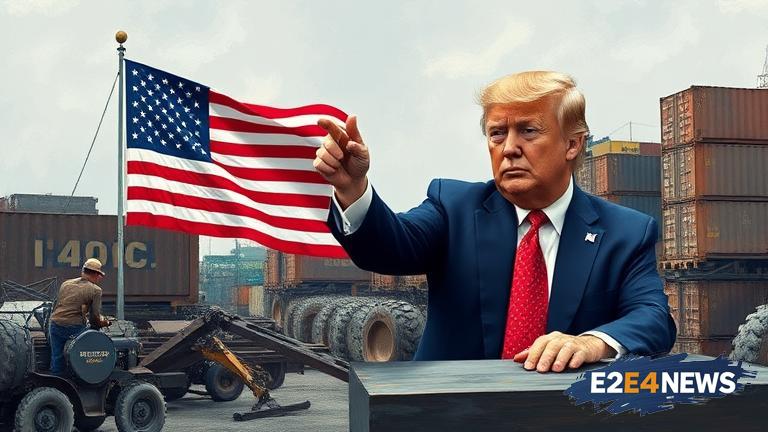The United States has imposed a 50% tariff on Brazilian steel, following an executive order signed by President Donald Trump. The move is aimed at protecting the US steel industry, which has been facing stiff competition from cheap imports. The tariffs will apply to all steel imports from Brazil, including semi-finished steel products. The decision has been met with criticism from Brazilian officials, who argue that the tariffs are unfair and will harm the country’s economy. The US has been increasing tariffs on steel imports from various countries, citing national security concerns. The Trump administration has been using Section 232 of the Trade Expansion Act to impose tariffs on steel and aluminum imports. The section allows the President to impose tariffs on imports that are deemed a threat to national security. The US steel industry has been lobbying for protection from cheap imports, arguing that they are hurting domestic producers. The tariffs on Brazilian steel are expected to have a significant impact on the country’s economy, which is already facing a recession. Brazil is one of the largest exporters of steel to the US, and the tariffs will likely lead to a decline in exports. The Brazilian government has vowed to take retaliatory measures against the US, which could lead to a trade war between the two countries. The US has also imposed tariffs on steel imports from other countries, including China, Canada, and Mexico. The tariffs have been met with criticism from various countries, who argue that they are unfair and will harm global trade. The World Trade Organization (WTO) has also expressed concerns about the tariffs, arguing that they could lead to a trade war. The US has been using the tariffs as a tool to negotiate trade deals with other countries. The Trump administration has been seeking to renegotiate trade agreements with various countries, including the North American Free Trade Agreement (NAFTA). The tariffs on Brazilian steel are seen as a move to pressure the country to agree to a trade deal that is favorable to the US. The US steel industry has welcomed the tariffs, arguing that they will help to protect domestic producers. However, the tariffs are expected to have a negative impact on the US economy, as they will lead to higher prices for steel products. The tariffs are also expected to have a negative impact on the global economy, as they will lead to a decline in trade. The US has been facing criticism from various countries for its trade policies, which are seen as protectionist. The tariffs on Brazilian steel are seen as a move to protect the US steel industry, but they are also expected to have a negative impact on the global economy. The US and Brazil have a long-standing trade relationship, and the tariffs are expected to have a significant impact on the relationship. The Brazilian government has vowed to take all necessary measures to protect the country’s economy, including retaliatory measures against the US. The tariffs on Brazilian steel are seen as a move to pressure the country to agree to a trade deal that is favorable to the US, but they are also expected to have a negative impact on the global economy. The US steel industry has welcomed the tariffs, but they are expected to have a negative impact on the US economy. The tariffs are also expected to have a negative impact on the global economy, as they will lead to a decline in trade. The US has been facing criticism from various countries for its trade policies, which are seen as protectionist. The tariffs on Brazilian steel are seen as a move to protect the US steel industry, but they are also expected to have a negative impact on the global economy.
